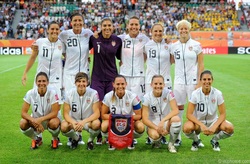Lack of monstrous sponsorship and advertising dollars notwithstanding, I believe one of the reasons behind Americans' lukewarm love for soccer is lack of personal history. Think about your own experience. What teams do you follow with a fervor? What sporting events do you just have to watch? More than likely, there is some thread of personal history involved. Maybe you completely come alive during Virginia Tech football season because VT is your alma mater and, however subliminally, you equate Tech football with your carefree college days. Maybe you gnash your teeth for days when the Boston Red Sox fall apart late in the season, because you and your dad (and his dad) spent many a warm afternoon watching them play at Fenway. Sport fanaticism is so personal and so often rooted in history that fans often feel like they are part of the team.
Soccer is still a relatively young sport in the United States and players often have to go abroad to get the experience and training they need to become world-class. Thus soccer is automatically at a disadvantage for getting into Americans' personal histories. Over time and as the demographics of the country evolve (i.e. higher proportions of Latin Americans, who revere "football"), soccer may well come into a larger following. Until then, though, Major League Soccer (MLS) should consider ways to weave itself into the personal histories of American viewers. Perhaps, MLS can offer " Daddy (or Mommy) & Me" promotions where local, junior soccer players can play a short scrimmage at half-time and get discounted tickets for their parents to watch the rest of the game with their kids. Should MLS players do more grass-roots marketing such as guest starring at soccer clinics for local clubs?
Tapping into personal history can be an important marketing strategy for any consumer business, not just sports. Kraft macaroni recently launched Homestyle Deluxe. No longer are they just offering a quick and easy way to get dinner on the table, but they are tapping into people's history (real or imagined) of homemade mac and cheese lovingly prepared by their mothers. How can your business tap into consumer's personal history to create growth and loyalty?


 RSS Feed
RSS Feed
